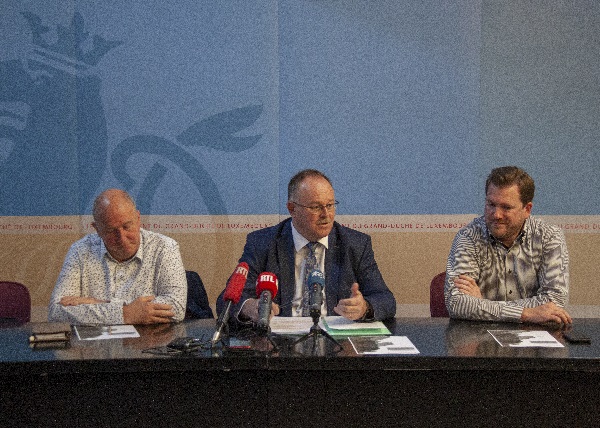 L-R: Dr. Felix Wildschutz, Director Administration of Veterinary Services; Romain Schneider, Minister of Agriculture, Viticulture and Rural Development; Dr. Laurent Schley, Deputy Director Administration of Nature and Forests;
Credit: MA
L-R: Dr. Felix Wildschutz, Director Administration of Veterinary Services; Romain Schneider, Minister of Agriculture, Viticulture and Rural Development; Dr. Laurent Schley, Deputy Director Administration of Nature and Forests;
Credit: MA
Following the Cabinet meeting of 26 April 2019, the Luxembourg authorities have updated the national plan for the reduction of wild boar in relation to African swine fever.
During a recent visit of the European authorities, Luxembourg presented the implemented preventative measures against the spread of African swine fever to an expert from the European Commission. In fact, the terms of the national plan for the reduction of wild boar (pursuant to Article 3 of the Grand-Ducal Regulation of 29 March 2019) has been updated.
The reduction plan has two objectives: the reduction of the wild boar population in the prevention zone, bounded on the north by the A6 motorway from Steinfort to Luxembourg, on the east by the A4 from Luxembourg to Esch-sur-Alzette and by the Belgian and French borders; the de-population of wild boars in the "white zone". To achieve these objectives, two types of measures are implemented, depending on the areas concerned. Firstly, the hunt will be intensified in the "prevention zone" in accordance with the law of 25 May 2011 on hunting. Indeed, the Director of the Veterinary Services Administration and the Director of the Administration of Nature and Forests have called for maximum mobilisation of hunters to reduce the wild boar population in this area.
Secondly, in the "white zone" tenants of hunting rights are called to drastically reduce the population of wild boars. A consultation and information meeting was held with the hunters concerned. In order to compensate for the losses and expenses incurred, a health allowance of €100 will be paid for any boar shot in the white area whose position at the time of its decease was geolocated and which is sent to a health centre.
In a second phase and if necessary, the Administration of Nature and Forests will set up in the "white zone" catching devices for wild boars to ensure the depopulation of the area. All corpses in the white zone are transported to a collection centre to be tested for the African swine fever virus in accordance with the biosecurity measures defined by the Veterinary Services Administration. The corpses are then destroyed under official control.
With regard to the "prevention zone", all logging activities as well as access and movement of people and goods remain authorised. Within the "white zone" the same provisions as in the "prevention zone" apply as long as there is no introduction of the virus into the zone. Where appropriate, these measures may be strengthened or abandoned.
These new provisions will come into effect as soon as the fence along the Belgian border is definitively put in place; this work is expected to finish in one week.
The European Commission expert expressed satisfaction with the preventive measures in place and advised the Luxembourg authorities to proceed as quickly as possible with the reduction of wild boar within the white zone in order to obtain a depopulated wild boar zone by the end of July at the latest.
On this occasion, Minister of Agriculture Romain Schneider pointed out that whilst these preventive measures are intended to stop the spread of the virus, so far zero cases of African swine fever have been detected in Luxembourg (from 173 tests).








